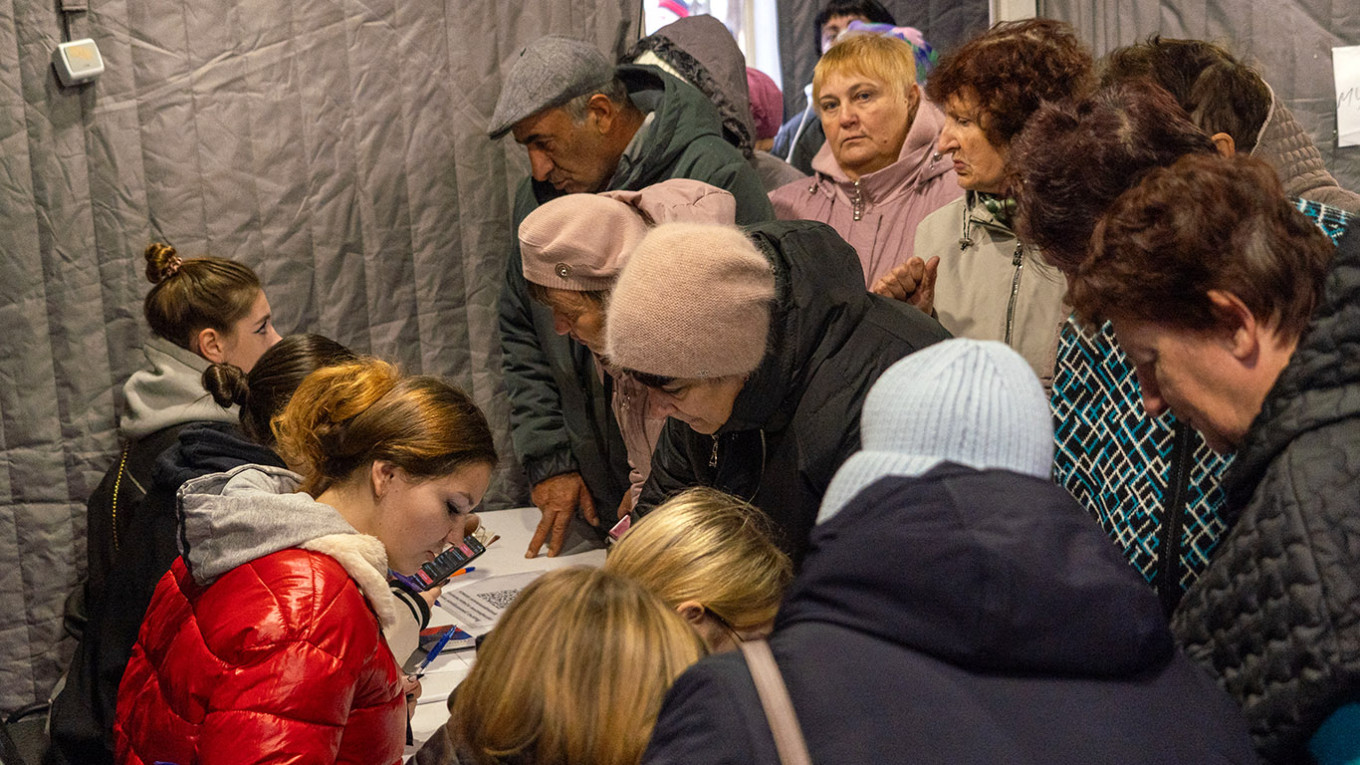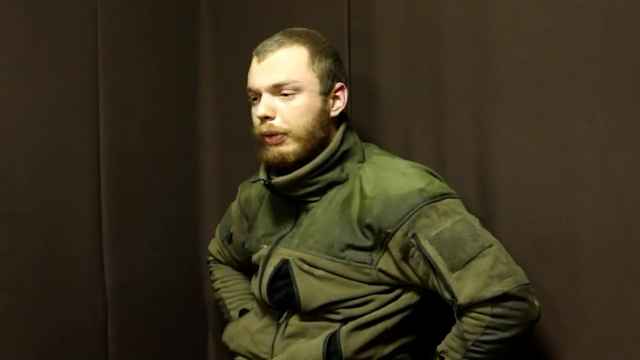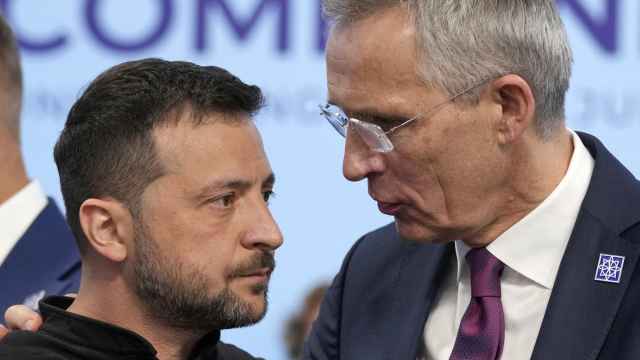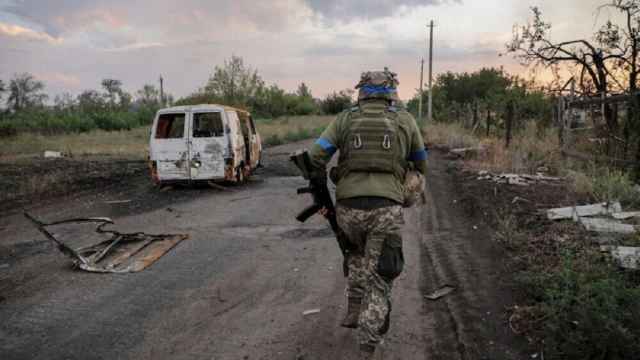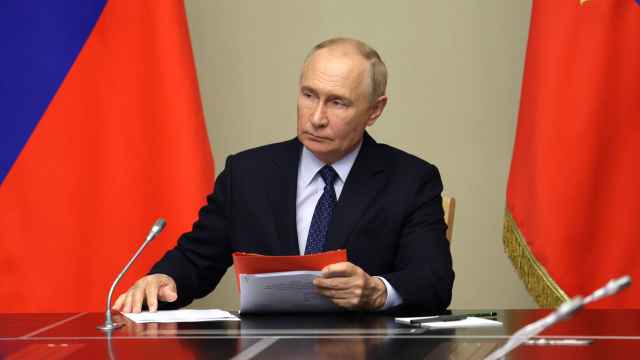Irina last spoke to her parents who live in Russia’s Kursk region six months ago, before Ukrainian troops stormed across the border and seized dozens of square kilometers of land.
Since then, she has received no word on what happened to the elderly couple in their 70s.
“I called my parents [before the incursion]. They said there was heavy shelling, but they thought things would calm down,” said Irina, whose name has been changed for safety reasons.
“By the time I was trying to assess the situation and see if I could go there, it became clear that leaving the [occupied] area was still an option, but going there was no longer possible,” she recalled in a phone interview with The Moscow Times.
Unable to pick up her parents herself, Irina also said that volunteers and soldiers could not evacuate them because their village was one of the closest settlements to Ukraine.
After searching for them in the regional capital of Kursk, hoping they had managed to escape the battlefield — but with no success — Irina is now bombarding Russian authorities with official requests for information, but also to no avail.
Like Irina, hundreds of Kursk residents have also been looking for their loved ones who remain in territory taken by Ukrainian forces.
What is happening in occupied Kursk?
Dozens of Kursk settlements near the border have been under Kyiv’s control for months.
The Kyiv-occupied areas of the Kursk region are expected to be one of Ukraine’s main bargaining chips in the upcoming peace talks between Presidents Vladimir Putin and Donald Trump.
During the early days of their August incursion, Ukrainian forces advanced up to 35 kilometers into the Kursk region. By Feb. 5, Russian forces had regained about 57% of this area, or roughly 655 square kilometers, according to the U.S.-based Institute for the Study of War. A senior Russian army general said Thursday that Russia had retaken 64% of the occupied Kursk region.
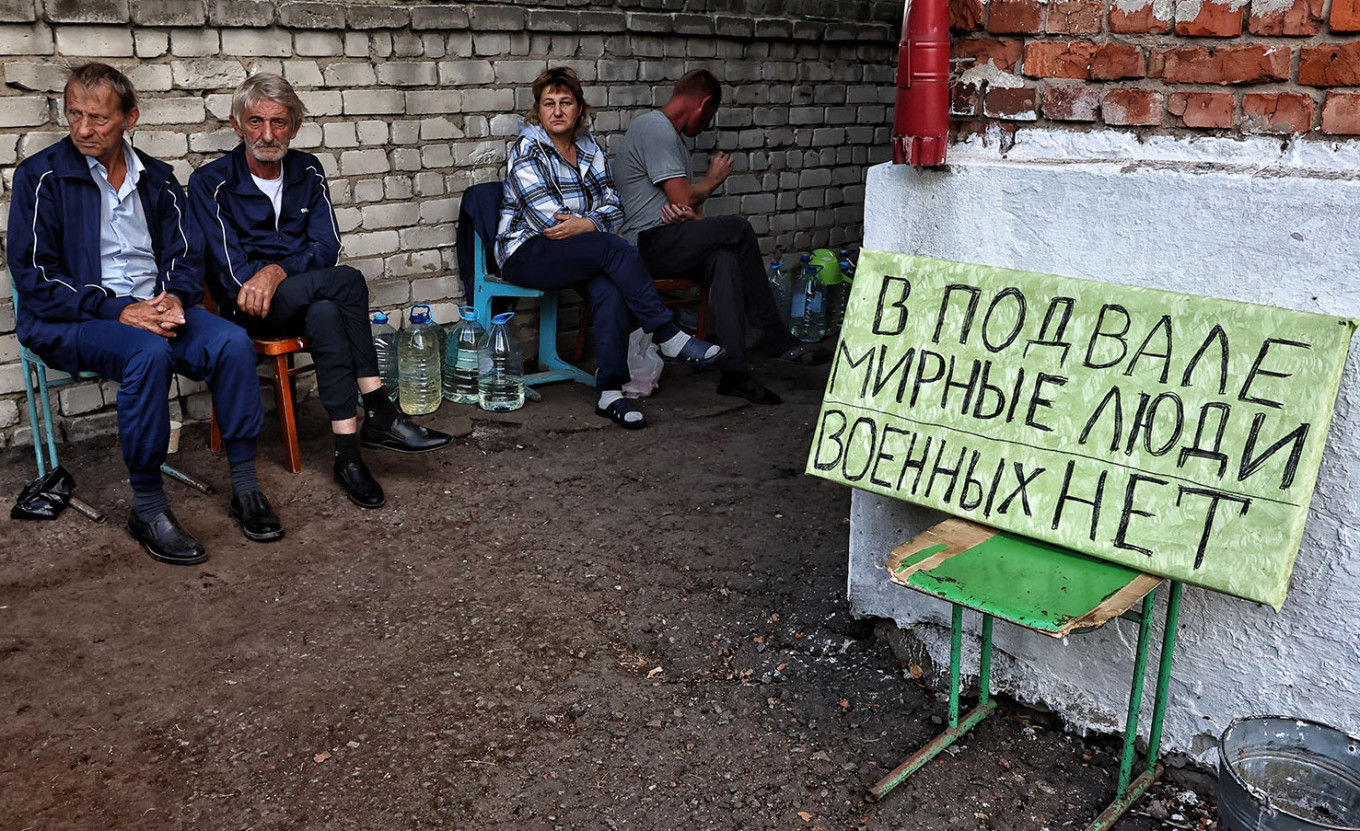
Kursk residents who could not evacuate during the early August assault — mostly from villages surrounding the town of Sudzha, located less than 10 kilometers from the Russia-Ukraine border — now remain in territory controlled by Ukrainian forces.
The Moscow Times could not independently verify the current conditions for Russian civilians in areas under Ukrainian control.
Locals who appeared in footage released by Kyiv’s side claimed that Ukrainian troops treated them well, provided food supplies and ensured access to essential medicines. A video published by Ukrainian TRO Media, which films in Kursk, also shows Ukrainian forces distributing bread, tea and matches to civilians.
Most of the people featured in the videos are elderly. Some of them report that their homes had been destroyed, forcing them to stay with relatives, friends or in a boarding school in Sudzha where dozens of civilians were sheltering. The school was struck this month, with Russia and Kyiv trading blame for the attack.
While most of those filmed by Ukraine send messages to their loved ones, saying they are alive or searching for their relatives, some also voice their political discontent.
“The Russians left me without a home, the Russians burned down my house… Russians are killing Russians… The Ukrainian soldiers treat us very well,” a man who identified himself as Sudzha resident Anatoly Golovnev told a Ukrainian film crew.
All of the people shown in these videos are individuals living under occupation, who along with prisoners of war are protected from “public curiosity” under international humanitarian law.
Russia paints a different picture of the reality under Ukrainian control.
In a video recorded by the state-run RIA Novosti news agency, two women recently evacuated by Russian forces from the Kursk region village of Nikolaev-Daryino said they “survived as best as they could.”
“[We were] without communication, water, electricity and heat,” they said, adding that allegedly Ukraine also deliberately destroyed their stockpiled food.
Relatives of those trapped in Ukrainian-held areas said the only way to reach them was through Ukrainian soldiers, making it impossible to get an unbiased account of the situation for civilians from either side.
Ukraine this month launched a new series of assaults in Kursk, defending the incursion as a "very important operation" in possible negotiations with Moscow. Russia’s Defense Ministry repeatedly said that its troops “continue to crush Ukrainian forces” in the region.
Missing in Kursk: official vs. family counts
There is no independently verified information on the number of Kursk residents who remain trapped in the territory taken by Ukraine.
In early January, Russian human rights commissioner Tatyana Moskalkova released a list of 517 Kursk region residents who had gone missing after Ukraine’s offensive.
Kursk residents criticized the list, which included names of relatives who reported the missing, incomplete names like “Grandmother of Litvinova E.G.,” and at least one woman who was killed during the incursion.
“We [relatives] have no idea how this list was compiled or why it was published. But, of course, we are not interested in the list itself — we understand that to organize a humanitarian mission or open an evacuation corridor, a complete and accurate list of people who are there is needed,” Irina told The Moscow Times.
In an apparent attempt to calm the public, acting Kursk region Governor Alexander Khinshtein said last month that the list “was not exhaustive.” Regional police had received reports of at least 1,174 missing persons, 240 of whom were found, he said.
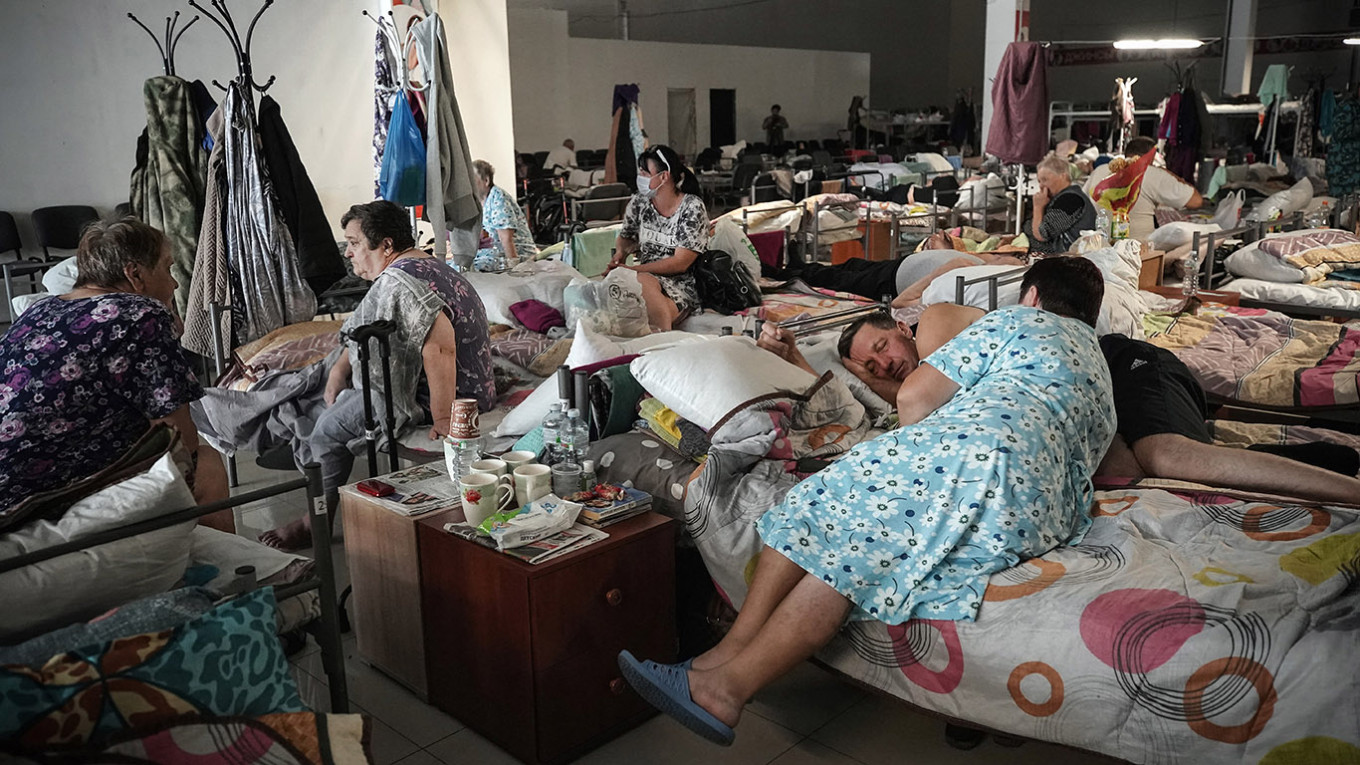
Kursk authorities have also launched a registry for residents of border areas with whom relatives have lost contact — but the full list of missing persons and the number of those found were not made public.
The spokesman for Ukraine's army operating in Kursk told AFP this month that over 1,500 Russians were still living in areas under Ukraine's control.
At the same time, relatives of the missing have estimated that as many as 3,000 people could be trapped in occupied areas.
They also said that they had no verified data on how many people might have died — not only from shelling but also from other causes.
“There is no medical care, no medicine supplies, no proper nutrition. Many people are hiding in cellars — you can imagine the risk of pneumonia, colds and other [diseases],” Irina told The Moscow Times.
Missing relatives’ demands
One of the relatives’ main demands is the establishment of a humanitarian corridor to allow civilians to evacuate from Ukrainian-held areas. But this corridor has not yet materialized despite Moscow and Kyiv’s stated readiness to facilitate it.
Ukrainian President Volodymyr Zelensky told AFP on Tuesday that Kyiv was “ready to open a humanitarian corridor from the Kursk region to the depths of Russia in response to an official request” from Moscow.
Russian human rights commissioner Moskalkova said the evacuation issue could be “resolved positively,” adding that Moscow “was working closely with Ukraine.”
Kremlin spokesman Dmitry Peskov said Russian authorities were doing “everything possible for Kursk residents,” but added that "the discussion of [the humanitarian corridor] depends on contacts being made through military channels, which undoubtedly cannot take place in a public setting."
At least 46 civilians made their way back to Russia in November. Around 100 civilians were reportedly evacuated to the Ukrainian city of Sumy, relatives told the independent news outlet Agentstvo this week.
In the meantime, relatives of those trapped in occupied areas launched a social media campaign appealing for help in rescuing their loved ones using the hashtag #YaMySudzha (I Am/We Are Sudzha).
Irina said Kursk feels left behind by both Russian authorities and fellow citizens — a rare expression of anger toward the government at a time when dissent is harshly suppressed.
“People are talking about how we’ve been abandoned,” she said. “And they’re saying it openly.”
A Message from The Moscow Times:
Dear readers,
We are facing unprecedented challenges. Russia's Prosecutor General's Office has designated The Moscow Times as an "undesirable" organization, criminalizing our work and putting our staff at risk of prosecution. This follows our earlier unjust labeling as a "foreign agent."
These actions are direct attempts to silence independent journalism in Russia. The authorities claim our work "discredits the decisions of the Russian leadership." We see things differently: we strive to provide accurate, unbiased reporting on Russia.
We, the journalists of The Moscow Times, refuse to be silenced. But to continue our work, we need your help.
Your support, no matter how small, makes a world of difference. If you can, please support us monthly starting from just $2. It's quick to set up, and every contribution makes a significant impact.
By supporting The Moscow Times, you're defending open, independent journalism in the face of repression. Thank you for standing with us.
Remind me later.



